The conference was attended by representatives of leaders of departments, branches, unions, districts, towns, and cities. Besides, there were nearly 300 delegates representing workers, the Executive Committee of the Grassroots Trade Union, and the Board of Directors of enterprises in Thuan An, Di An, Tan Uyen, and Thu Dau Mot cities.
Build a relocation support policy
At the conference, labor representatives wondered about the province's policy of relocating the factory to the North that would affect the lives of workers such as changing accommodations, children's learning environment, and difficulties in commuting, etc. The representatives also asked questions about policies for workers and businesses. Mr. Doan Dinh Khanh - representing workers of Esquel Garment Manufacturing Viet Nam Co., Ltd. (Tan Uyen City) is interested in supporting regimes and policies such as accommodation and educational conditions of workers' children during the work stoppage to move the factory. Workers want the government to pay attention to building social housing, motel rooms, and service utilities such as schools, and reducing tuition for workers' children when moving to a new place.
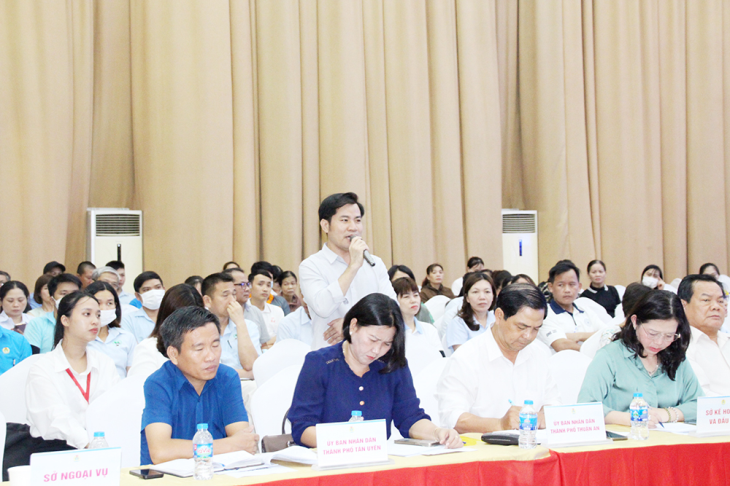
Workers shared concerns and worries about the factory relocation
Representative of Dong Tam Lacquer Company (Thu Dau Mot City) said that the relocation location must be consistent with the industry characteristics of companies in the traditional lacquer field. When businesses are relocated and forced to stop production, it will affect the progress of contracts with partners and workers. Therefore, it is hoped that the province will have regimes and policies to support lacquer businesses and local workers.
Workers also want the province to provide specific information about policies, a list of businesses that need to relocate, and relocation locations so that workers can grasp the information.
In addition, businesses are interested in the relocation itinerary, relocation criteria as well as preferential policies on land lease and support policies when relocating. Many businesses are interested in converting land functions and subleasing currently used premises. Businesses expressed that they are currently in the recovery phase, so it is still very difficult to have enough finances to relocate and implement training policies for workers.
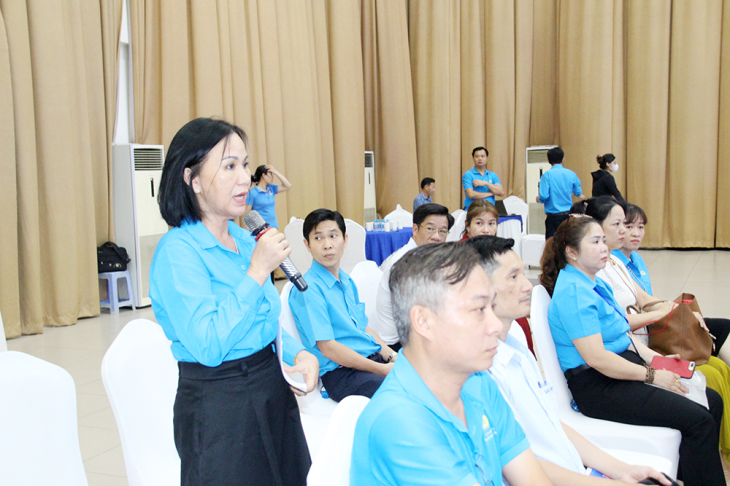
Representative of the Grassroots Trade Union asked questions related to the factory relocation
Ms. Le Thi Thuy - Business Manager of Viet HSing International Garment Company (Binh Chuan ward, Thuan An city) said that the land lease term is 50 years, but it has only been rented and used for 25 years. Meanwhile, in recent years, businesses have had many difficulties due to the impact of epidemics and political conflicts in the world. Currently, businesses do not have enough strength to relocate. If businesses must relocate, they want to exchange land and have a factory available to assemble production machinery immediately.
Responding to the concerns of workers and businesses, Ms. Nguyen Thanh Ha - Vice Director of the Department of Industry and Trade said that the province is collecting comments from units on a plan to develop criteria and policies. From that, the province will support and implement pilot conversion of functions and relocation of businesses located outside industrial zones and clusters in the South to Northern industrial zones. In 2024, the province will develop criteria to identify businesses converting functions and relocating. Besides, the province will develop and improve relocation support policies, and organize a workshop to collect opinions on determining criteria and policies to support relocation. It is necessary to implement pilot relocation of businesses (expected to relocate 05-07 businesses), summarize and evaluate the results of implementation of function conversion and relocation.
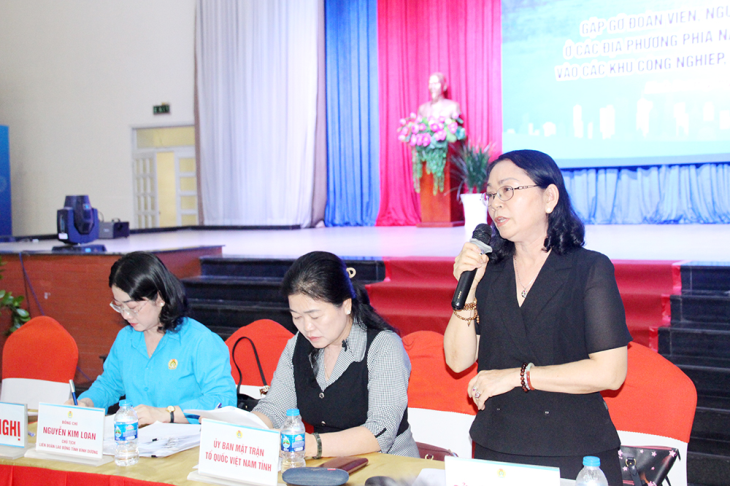
Ms. Nguyen Thanh Ha - Vice Director of the Department of Industry and Trade informed about the province's relocation policy
Regarding the development of policy groups to support relocation, it is proposed to have policy groups to support workers and businesses. For employees: Supporting employees during production stoppage, paying unemployment benefits to workers who must quit their jobs due to relocation, and supporting vocational training for workers at new locations. There should be social Insurance policies to ensure workers' rights and specific policies to support social housing for affected workers. For businesses: Supporting industrial promotion and trade promotion, having investment incentive policies for production and business investment projects in industrial parks, developing science, technology, and innovation, loan support, and supporting land and factory rental at new locations. In particular, it is proposed new policies to support businesses in relocating and converting functions such as a policy on changing the purpose of factories and land, using land under provincial planning, debt lending policy, and extension of payment time for land use conversion. There are policies to support loans for investment in building new production facilities and policies to support fees for implementing administrative procedures.
Orientation of industrial zones and clusters for relocation: industrial zones are arranged for 5% of land funds throughout the province. Cay Truong 2 Industrial Park and the remaining industrial parks are according to the province's planning. There are 07 existing industrial clusters, 12 industrial clusters in Dau Tieng district, 07 industrial clusters in Bac Tan Uyen district, and 09 industrial clusters in Phu Giao district.
Create all conditions for stable production and lives of workers
Regarding information about plans to create conditions for workers to relocate, Ms. Nguyen Thanh Ha - Vice Director of the Department of Industry and Trade said that the province has also developed plans to build social housing, social-cultural institutions such as schools, hospitals, and entertainment areas to best serve the demands of workers when relocating to new locations.
Mr. Pham Van Tuyen - Vice Director of the Department of Labor, War Invalids and Social Affairs shared the difficulties and thoughts of workers and businesses when implementing the province's policy. He affirmed that the relocation and conversion of functions of businesses located outside the Southern industrial zones and clusters to the North is the province's major orientation to build Binh Duong towards sustainable development and to become a smart urban area. At the same time, it aims to rebuild the province's urban areas. Therefore, the province's perspective is to research and develop solutions and tools to encourage businesses to relocate and convert functions. It is necessary to support and implement step by step according to the roadmap. Besides, it needs to minimize forced relocation.
"The province assesses that when relocating businesses, relocating machinery and equipment is simple, but workers are not. The province must calculate all conditions to meet the needs of workers. The province also researches legal regulations related to employee benefits such as work stoppages and leave of absence. At the same time, the province needs to consider additional specific policies to create the best conditions for workers when relocating." – Mr. Pham Van Tuyen said.
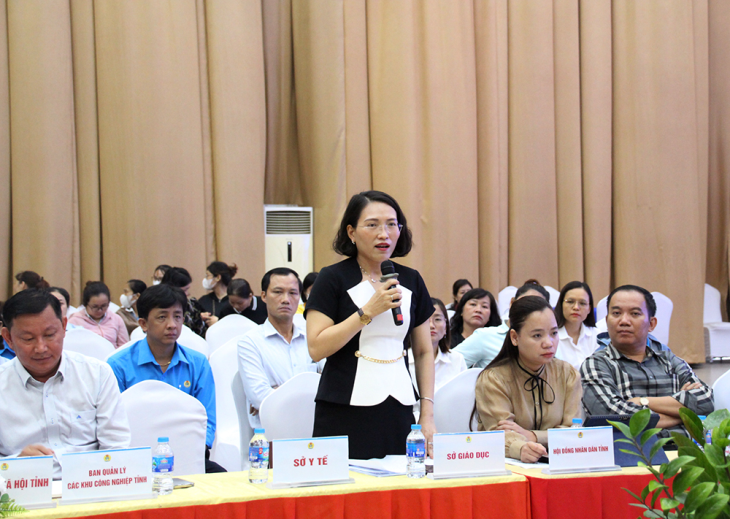
Ms. Truong Hai Thanh - Vice Director of the Department of Education and Training answers issues related to building facilities to meet the learning needs of workers' children
Regarding the planning of schools in the Northern industrial zones and clusters of the province to meet the learning needs of workers' children, Ms. Truong Hai Thanh - Vice Director of the Department of Education and Training said that the Department is advising the Provincial People's Committee to issue a Project to improve the quality of human resources and facilities of the Education and Training sector for the period 2024-2030. Accordingly, there is specific planning for schools in the Northern region of the province to meet the learning needs of workers' children. It is predicted that by 2030, the province's facilities will increase by 140 schools. The Department will coordinate with units to discuss and propose the best plan for the learning needs of workers' children when relocating the factory. Regarding policies related to tuition, the Provincial People's Council has issued a policy to support preschool children in industrial zones and clusters in the province, and it is necessary to specifically stipulate the support regime.
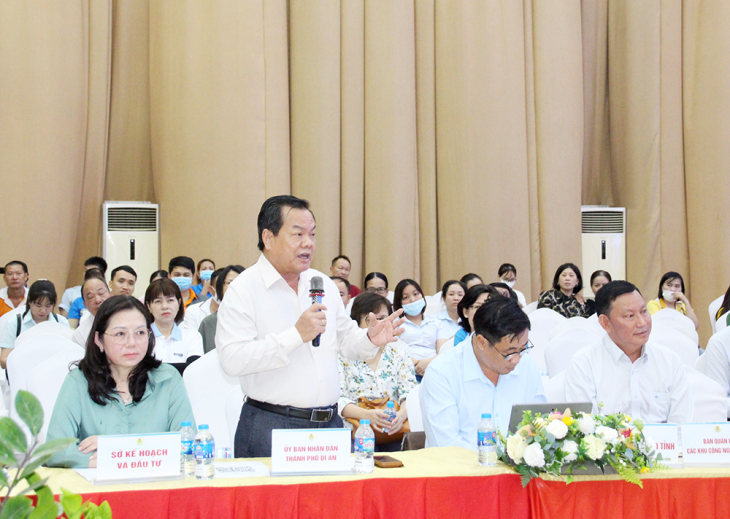
Mr. Pham Van Bay - Vice Chairman of Di An City People's Committee shared information with businesses and workers about local policies when relocating factories
Di An City is a locality with a large number of businesses located outside industrial zones and clusters, so many workers and businesses here are interested in the policies when relocating. Regarding this issue, Mr. Pham Van Bay - Vice Chairman of Di An City People's Committee thanked workers and businesses in the city over the past time for always considering Di An as their second hometown. Therefore, Di An always considers workers as citizens of the city, who must enjoy the city's development, and it is necessary to especially pay more attention and give more priority to the lives of workers. He hopes that Northern localities will welcome businesses and workers from the South with "whole heart". It needs to take care of facilities and cultural institutions to meet the needs of learning and entertainment of workers. "Di An will be extremely responsible for implementing the best, most effective, and highest quality policies of the province according to the roadmap, relocation, and conversion time to ensure the best for businesses and workers to feel secure to move or change functions." –Mr. Pham Van Bay affirmed.
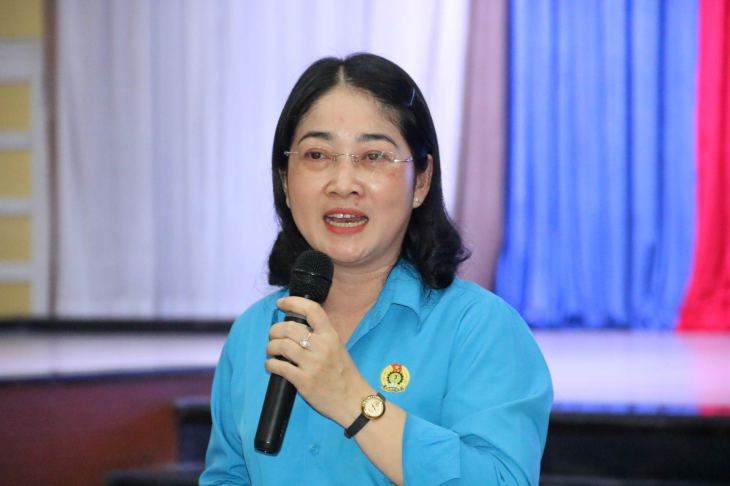
Ms. Nguyen Kim Loan - Chairwoman of the Provincial Confederation of Labor spoke to conclude the conference
Through the opinions of workers, businesses, departments, branches, and localities, Ms. Nguyen Kim Loan - Chairwoman of the Provincial Confederation of Labor affirmed that Binh Duong province always puts the benefits of businesses and workers first when relocating the factory. After this conference, the Trade Union will continue to receive opinions and recommendations from businesses and workers, then report and make recommendations to the Provincial People's Committee to develop appropriate policies.